Suchergebnisse für "Factsheet: Energietechnologien gestalten, die für alle sinnvoll und nutzbar sind"
Smart Energy Systems / SESWA - Award
Im Rahmen der Smart Energy Systems Week wird der "Smart Energy Systems Award“ in vier Kategorien vergeben und zeichnet neben herausragenden wissenschaftlichen Arbeiten und Forschungsprojekten auch konkrete Demonstrationsvorhaben und Start Ups aus.
Low Tech – High Effect! Eine Übersicht über nachhaltige Low Tech Gebäude
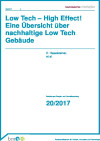
In dieser Studie wurden Ansätze von Low Tech Gebäuden näher betrachtet und besonders innovativ und repräsentativ erscheinende Konzepte detailliert dokumentiert. Ziel war es, den derzeitigen Stand der Technik und das vorhandene Know-how und Wissen anhand realisierter Beispiele aufzuarbeiten sowie Potenziale zur Weiterentwicklung aufzuzeigen.
Schriftenreihe
20/2017
Edeltraud Haselsteiner, Andrea Bodvay, Susanne Gosztonyi, Anita Preisler, Michael Berger, Bernhard Gasser
Herausgeber: BMVIT
Deutsch, 192 Seiten
Downloads zur Publikation
MADOKLI - Mannersdorf climate fit! Using local resources to combat and adapt to climate change for a climate-neutral neighbourhood
Development of a climate-neutral neighbourhood by integrating previously unused heat sources and sinks, such as the underground Mühlbach stream, to supply municipal buildings, to establish use-oriented water management and to develop solutions for climate-friendly outdoor spaces in the centre of Mannersdorf am Leithagebirge.
Evaluierung Visionärer Architekturkonzepte
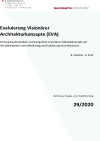
Prüfung bauphysikalisch und energetisch innovativer Gebäudekonzepte auf ihre Machbarkeit unter Monitoring und Evaluierung eines Mock-Ups.
Schriftenreihe
29/2020
B. Sommer, U. Pont, et al.
Herausgeber: BMK
Deutsch, 71 Seiten
Downloads zur Publikation
Green BIM 2. Green Information Modelling and Operation: Transformation of the Green Sector through digitalisation
With the project "Green BIM 2" the technology leap from the previous project "Green BIM" – namely the use of BIM in the field of building greening – is continued for further application fields of landscape planning and the results are transmitted into working practice.
Subtraction as a measure to Preserve and Insulate historic Developments by Electric Robots (SPIDER)
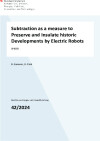
In dieser Sondierung soll das Potential von autonomen, daten-getriebenen Robotern erschlossen werden, die in einem andauernden kontinuierlichen Prozess thermische Performanceverbesserungen durch Schaffung von dämmenden Lufteinschlüssen erzielen.
Schriftenreihe
42/2024
B. Sommer, U. Pont
Herausgeber: BMK
Deutsch, 84 Seiten
Downloads zur Publikation
Favorite Facades Reuse
The exploratory project "Favorite Facade ReUse" has set itself the goal of renovating and thermally upgrading buildings with curtain facades with a maximum proportion of reuse and the greatest possible protection of the residents. The authenticity of the building is preserved, and CO2 emissions are minimized.
Climate communities
Transdisciplinarily developed climate-friendly solutions for decarbonisation of the building stock in small and medium-sized municipalities. The application of the sample solutions will readily identifiable through a web tool.
Optimierung der SOLARenergienutzung in URbanen Energiesystemen (URSOLAR)
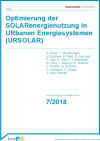
URSOLAR stellt EntscheidungsträgerInnen eine Roadmap zur integrierten urbanen Solarenergie-nutzung zur Verfügung. Es wird aufgezeigt, wie Photovoltaik (PV) und Solarthermie angepasst an infrastrukturelle und rechtliche Gegebenheiten in idealtypischen Stadtquartieren aus ökonomischer, ökologischer und sozialer Sicht sowie unter Berücksichtig von Stakeholder-Interessen optimal ge-nutzt werden können.
Schriftenreihe
7/2018
A. Posch, T. Brudermann, M. Buchner, E. Fleiß, D. Geringer, P. Hart, S. Hatzl, T. Kallsperger, G. Lang, T. Mayrold, E. Meißner, C. Reischl, G. Schnedl, S. Seebauer, K. Stöger, A. Würz-Stalder
Herausgeber: BMVIT
Deutsch, 137 Seiten
Downloads zur Publikation
GeoHub - Sustainable heat management of near-surface geothermal energy in urban environments
Innovative approaches to streamline geothermal projects from planning to operation, ensuring they are climate-neutral, resource-efficient, and economically viable.
Photonic Cooling - Effizientere Gebäudekühlung durch Nutzung von Photonik
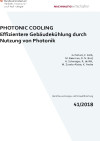
In diesem Sondierungsprojekt wurde der Ansatz des Photonic Cooling zur Gebäudekühlung auf seine praktische und kostengünstige Umsetzbarkeit und im Bezug zu seiner Wirkung bewertet.
Schriftenreihe
41/2018
Gerhard Peharz, Florian Kolb, Martin Beerman, David Neil Bird, Hannes Schwaiger, Rosmarie de Wit, Maja Zuvela-Aloise, Konrad Andre
Herausgeber: BMVIT
Deutsch, 107 Seiten
Downloads zur Publikation
BIPV-Booster - Game changer for façade-integrated PV systems: Development of proof-free constructions regarding fire protection
The central result of the project will be the development of a catalogue of “proof-free constructions” with regard to fire protection for façade-integrated photovoltaic systems, particularly for the more difficult case of high-rise buildings. These constructions will be defined in the project and tested in fire tests. The fire tests are to be supplemented by electrical and material-related module tests before and after the fire tests.
MARGRET - Measurement of greened/non-greened objects for the adaptation of calculation models
Development of measurement methods to determine the influence of greening measures on greened versus non-greened reference objects with contemporary building standards under uniform framework conditions. Proposals for adaptations of calculation models or standards to e.g. enable an integration in the energy performance certificate.
QualitySysVillab - Protecting sustainable qualities in neighbourhood developments through process control and new digital methods
Development of a process concept to bring sustainable qualities in neighbourhood development from the intention and announcement level to the built reality. The process is supported by digital methods of energy and structural design and evaluated in the context of a case study.
FlexHP - AI-supported control models for optimising the flexibility of heat pumps to reduce the load on the electricity grid
Development of a new type of energy management system for heat pumps that enables methods for intelligent heat pump operation and thus maximises flexibility. This requires forecast-based models for control that utilise technologies such as machine learning.
Update Prunerstraße - Demonstrative building Prunerstraße 5: climate-neutral transformation of a space programme and an existing building
Together with the Bundesimmobiliengesellschaft (BIG), the University of Art Linz (KUL) aims to develop Prunerstraße 5 into a landmark project that meets the socially relevant demands of a university and at the same time sets progressive standards in the requirements determination, transformation, and sustainable development of existing buildings.
Lüftungskonzept Österreich
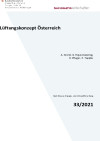
Ziel des Projektes ist die Schaffung eines Nachweisverfahrens (auf Basis Microsoft-Excel), welches zeigt, ob eine natürliche Lüftung bzw. Fensterlüftung bei einer Standardnutzung zur Vermeidung von Schimmelbildung ausreichend, bzw. in Hinblick auf eine ausreichende hygienische Luftqualität zumutbar ist.
Schriftenreihe
33/2021
A. Greml, G. Rojas-Kopeinig, R. Pfluger, P. Tappler
Herausgeber: BMK
Deutsch, 87 Seiten
Downloads zur Publikation
SELF²B - self-aware, self-diagnosing buildings, HVAC, and PV systems for the next generation of energy efficient operations
SELF²B develops and demonstrates an AI-based, self-learning, and self-diagnosing fault detection and diagnosis (FDD) solution for HVAC and PV systems in two buildings in Vienna. The innovation surpasses the current state of the art by combining semantic data, ontologies, and machine learning. The goal is to achieve energy savings and efficiency improvements in building operations and to make the technology widely applicable.
GreenGEO - Data-based integration of climate change adaptation measures into spatial planning
Green and blue infrastructure (GBI) is a key instrument in the fight against climate change. Nevertheless, deciding where and in what form it should be used most effectively remains a challenge in spatial planning practice. The development of a digital model that links location-specific climate risk data with suitable GBI measure proposals will make this much easier and more objective.
Decarb Alt Erlaa - Transformation of Alt Erlaa residential park into a climate neutral district
Exploration of a transformation of the Alt Erlaa residential park into a climate neutral district based on systematic potential analyses regarding structural measures, building technology measures and a sociological monitoring of the transformation process. The result of the exploratory study serves as a starting point for implementing the measures in a follow-up project.
